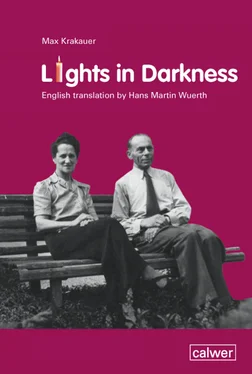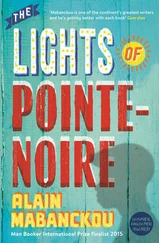After all of these troubles, worries, negotiations, trips and visits, we received an unexpected telegram from a woman friend who had managed to escape overnight to Czechoslovakia. It said, “Make bookings for Trinidad immediately.” It turned out that, contrary to expectations, Trinidad was open to all kinds of immigration. But there was a new and formidable obstacle: the bookings could only be made in Holland, and the money could only be paid in Dutch guilders.
Once again, a lot of precious time passed, but we prevailed. But when the first ships were on their way, the news reached us that Trinidad had suddenly been declared off limits to Jews. All Jews already at sea were forced to return. Our desperation got more serious, and without any option left, we considered the idea of illegal emigration. We had heard of these illegal emigrations often before that cost exorbitant amounts of money and offered virtually a zero guarantee for their success. Moreover, there were no safeguards against falling prey to swindlers. Still, one such offer appeared very reliable to me, that of entering Belgium illegally. When the first group of people tried to escape, they were arrested at the border. We never heard from any of them again because they had walked into a trap set by the Gestapo.
Until early 1943, such tactics of deceptions were the order of the day including those used by some members of the Gestapo who made a threefold profit. First, they collected the high fee from desperate people who had sacrificed everything to escape this living hell. Secondly, Gestapo members received some sort of reward from the high ranking officials for the capture of each escaping Jew. And thirdly, there was a chance for making a profit by selling the last possessions they took from these betrayed victims.
One final time I used all of my resources to enter the United States, but the closing of all American Consulates long before the outbreak of the war put a final stop to my frantic efforts. One plan after another to emigrate had been shattered by hideous circumstances, personal misfortunes, and painful coincidences. It is easy to ask, “Why in the world did you stay? Why didn’t you leave when there was still time?” I wonder how many were ready to give up their last possessions for a chance to escape. They would have been saved!
It was November of 1938. The so-called “von Rath-case” in Paris was responsible for fuelling the people’s rage, the burning of synagogues, and the destruction of Jewish stores, actions orchestrated via telegraph communications from Wilhelmsplatz in Berlin. “Reichskristallnacht” (Crystal Night) was sheer madness. The first massive wave of arrests of German Jews was set into motion within the Reich, and the deportations to concentration camps began. My name was on the hunters’ list, but I managed to flee from Leipzig to Berlin where I was hiding in the home of foreign-born Jewish friends. I had to leave my wife and child behind, who were harassed and interrogated day and night by the police and the SS who seemed determined to keep looking for me. In January 1939 my only daughter, Inge, managed to leave for England. We let her go with a heavy heart but were reassured by the fact that she had escaped the Nazis’ fangs.
In May, 1939 we moved to Berlin for good. We hoped to expedite our impending emigration with the help of consulates located there. But with the closing of the US Consulate, as mentioned before, this phase of our lives ended once and for all. As of October 1, l938 Jews were refused work in any business requiring travelling. Since I had earned minimal wages during the last few years, the last opportunity for a more or less meager existence was taken away.
The world was set ablaze, and the war touched all of mankind. One of the first war decrees announced in Germany was that of “Forced Labour for all Jews.” This did not mean performing labor in one’s area of specialty or former profession; rather, Jews were assigned to do the most demanding physical tasks, no matter whether one was a common worker, business man, or academician. Jews were usually given the task of excavating or demolishing something, of hauling garbage, and of doing similar jobs. Only when the war had wiped out one division of soldiers after another, and when workers in other industries had become virtually unavailable, were Jews recruited to help manufacture military goods. At this point the German Labour Front intervened, ruling that this work was too easy for Jews. In no uncertain terms it instructed all employers to use Jewish people for the most difficult and dirtiest jobs.
This labor was known as “working at the courtyards” (Hofarbeit). For ten, eleven and more hours per day we had to carry heavy objects around and lift garbage containers, no matter if one was physically fit to do this or not. A new administrative invention was to issue special food rations for Jews. This meant the sale of meat, fish, eggs, white bread, and all non-farming products was prohibited to Jews. Jews received no groceries other than five pounds of potatoes (if available at all), two pounds of turnips or red beets per person a week. Soon the Jews’ physical strength faded, and illnesses increased rapidly. Afraid of the Gestapo, workers tried to avoid sick calls, because everyone knew that the insurance companies had to file reports, as did the doctors who were associated with either one of these companies or with the state insurance company. One had to see a doctor after a sick leave of more than ten days.
Thus my wife and I were “forced into service,” i.e. we were divided into different groups by the labour office, the “Department for Jews,” that naturally was following special instructions. Then we were led away without an explanation. Only after we had reached our destination, we were informed where we had to work and what kind of work it was. Our salary was so small that it was impossible to make a living. By then, all Jewish possessions had been confiscated by a “Currency Office,” as the designated department of the Gestapo was known. Still, a few workers succeeded in setting aside a tiny amount of money for food, but when this happened they would receive no salary at all. Instead, it was credited to this Currency Office, but not before a 15% special tax had been deducted first. All Jews had to pay it, despite their intolerably low salaries and several standard deductions.
I had to do the kind of work I described until January 29, l943. For a whole year, my wife had to peel potatoes under the most dehumanizing conditions. For every 100 pounds she processed, two marks were paid. Her work place was a former butcher shop, where a little heat was generated by a tiny stove. As one knows, such shops are built without any heating system. The terribly cold winter of 1941 became an agony. So this place was heated whenever possible, with the result that those sitting next to the stove were roasting, while the others working in this large butcher shop were miserably cold. They had to clutch their peeling knives with stiff fingers that were discolored and had split-open. The smell of frozen potatoes thawing slowly worsened when the left-over peels were not picked up for days. In the summer months, one could barely stand the odor. The employer, a man named Otto Schade, and his woman friend – she owned the business – were the prototypes of all Germans who made a hefty profit at the expense of suffering Jews. Any request for a change in work place was out of the question because the employment agency’s response to such requests would be deportation.
After one year of this, my wife was relieved of this labor because there was a potatoe shortage. Unfortunately, her joy was short-lived. She was taken to a company that repaired film equipment for aircraft. Bleaches were used and similar acid chemicals that attacked both lungs and stomach and made most of the workers so sick that they could no longer keep their food down, as in my wife’s case. Fortunately, a Mr. Karl Berger, her boss, was just the opposite of those described before. He showed sympathy for the Jews who worked for him and who had been selected especially for this kind of work. Contrary to the precise orders he had received, he tried to get milk for the abused women as often as he could, and to reduce the exposure to poisonous gases. He also assisted his Jewish workers in various other ways, and in doing so, he violated existing regulations. More than once, he found himself in unpleasant situations with supervisory personnel. But he was one of those persons who were unconcerned about possible threats of punishment.
Читать дальше












